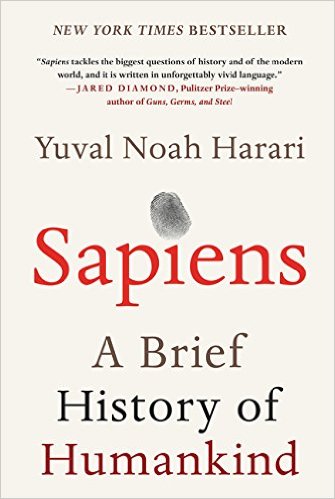Sapiens and sapientiae
Yuval Noah Harari’s Sapiens is great read. Harari apparently was trundling along as a rather specialised mediaeval historian when he was asked to teach a course on world history and this caused him to break out of his boundaries in no uncertain terms. One review describes it as a ‘starburst’, which I like, but it’s a starburst with humour as well as dazzle.
 There’s no way I’m going to summarise the context or direction of the book. I just want to pick up on Harari’s account of the positive aspects of nomadic foraging over the settled life of the pastoralist. Foraging apparently gave you a much more varied diet – you ate what you came across, or hunted, and that included berries and plants of different kinds, as opposed to what quickly became a boring and monotonous diet of whatever crops you learnt to cultivate.
There’s no way I’m going to summarise the context or direction of the book. I just want to pick up on Harari’s account of the positive aspects of nomadic foraging over the settled life of the pastoralist. Foraging apparently gave you a much more varied diet – you ate what you came across, or hunted, and that included berries and plants of different kinds, as opposed to what quickly became a boring and monotonous diet of whatever crops you learnt to cultivate.
But you as an individual also had to acquire a much more diverse range of skills and knowledge. You had to know about different environments, to make a variety of tools, understand what the signs were and so on. Apparently the average ancient forager knew how to turn a flint stone into a spear point in a matter of minutes, though quite how we know this is mystery to me.
Harari contrasts this with our current division of labour and knowledge:
“Today, most people in industrial societies don’t need to know much about the natural world in order to survive….You need to know a lot about your own tiny field of expertise, but for the vast majority of life’s necessities you rely blindly on the help of other experts.” (Cue joke about Michael Gove – is he an ancient forager manqué??)
He concludes:
“The human collective knows far more today than did the ancient bands. But at the individual level, ancient foragers were the most knowledgeable and skilful people in history.”
That’s quite a striking claim, and puts some of our more boastful contemporary claims to expertise into context. The PP relevance, though, is this: how far do we really mobilise our collective talents? Yes, ‘teamwork’ is supposed to be a highly valued competence today; but how far is the verbal obeisance to it matched by the practice of rewards? The common perception is that women are more inclined to teamwork. As Brenda, one of my interviewees, put it:
‘Women are interested in “getting stuff done”; they hate game-playing and internal politicking; they only build networks if they see them as a genuine vehicle for getting things done, and not for the same reason as men do, ie that is, personal advancement. Their language is about “we”, about looking for complementary skills in a team, recognising that they themselves cannot do it all. For men it is about “I”; competitive; their personal career.’
I’m not sure what the evidence is on the extent to which teamwork skills are rewarded. But Avivah Wittenberg-Cox’s excellent site is a likely place to find it. Her blogs are stuffed with useful links. The latest has links to particularly interesting research that strengthens the argument that real organisational change needs a focus on middle management as much as or probably more than CEO level. It’s a cultural issue as well as a symbolic one.
